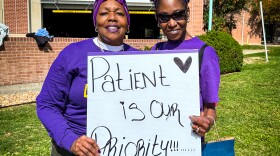A massive health care strike over wages and staffing shortages headed into its final day on Friday without a deal between industry giant Kaiser Permanente and the unions representing the 75,000 workers who picketed this week.
The three-day strike carried out in multiple states will officially end Saturday at 6 a.m., and workers were expected to return to their jobs in Kaiser's hospitals and clinics that serve nearly 13 million Americans. The two sides did not have any bargaining sessions scheduled after concluding their talks midday Wednesday.
The strike for three days in California — where most of Kaiser's facilities are located — as well as in Colorado, Oregon and Washington was a last resort after Kaiser executives ignored the short-staffing crisis worsened by the coronavirus pandemic, union officials said. Their goal was to bring the problems to the public's consciousness for support, according to the Coalition of Kaiser Permanente Unions. Some 180 workers from facilities in Virginia and Washington, D.C., also picketed but only on Wednesday.
"No health care worker wants to go on strike," Caroline Lucas, the coalition's executive director, said Thursday. "I hope that the last few days have helped escalate this issue."
The company based in Oakland, California, warned the work stoppage could cause delays in people getting appointments and scheduling non-urgent procedures.
Kaiser spokesperson Hilary Costa said the company was working to reconvene bargaining "as soon as possible."
Unions representing Kaiser workers in August asked for a $25 hourly minimum wage, as well as increases of 7% each year in the first two years and 6.25% each year in the two years afterward.
Kaiser, which turned a $2.1 billion profit for the quarter, said in a statement Wednesday that it proposes minimum hourly wages between $21 and $23 depending on the location. The company said it also completed hiring 10,000 more people, adding to the 51,000 workers the hospital system has brought on board since 2022.
Union members say understaffing is boosting the hospital system's profits but hurting patients, and executives have been bargaining in bad faith during negotiations.
Lucas said the two sides have made several tentative agreements, but nothing in major areas like long-term staffing plans and wage increases. The coalition, which represents about 85,000 of the health system's employees nationally, is waiting for Kaiser to return to the table, she added.
"They could call now and say, 'We want to pull together a Zoom in 20 minutes,'" she said. "We would be on that Zoom in 20 minutes."
The workers' last contract was negotiated in 2019, before the pandemic.
The strike comes in a year when there have been work stoppages within multiple industries, including transportation, entertainment and hospitality. The health care industry alone has been hit by several strikes this year as it confronts burnout from heavy workloads — problems greatly exacerbated by the COVID-19 pandemic.
The White House on Thursday said President Joe Biden "always" supports union members who choose to strike when asked about the demonstration by Kaiser workers. The president last month joined picketing United Auto Workers in Michigan on the 12th day of their strike against major carmakers, becoming the first known sitting president in U.S. history to join an active picket line.
___
Associated Press Writer Seung Min Kim contributed.




